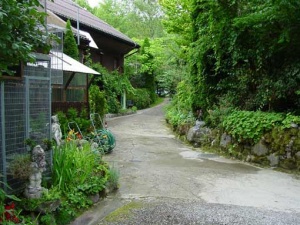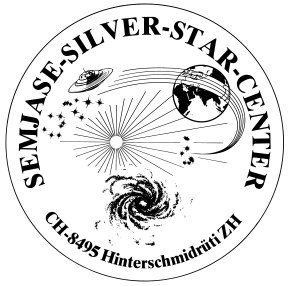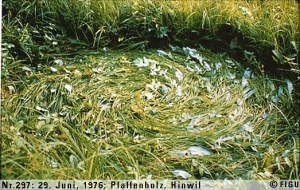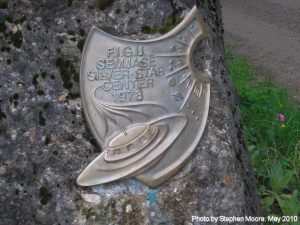Semjase Silver Star Centre
FIGU
SEMJASE SILVER STAR CENTRE
SWITZERLAND
Please note that Future Of Mankind is not an official FIGU website.
The information here about the SSSC is not official.
Contact with FIGU can be made via the FIGU website.
Contact with the owner of this site can be made via webmaster@futureofmankind.co.uk

INTRODUCTION
The Semjase Silver Star Centre is in Switzerland... [continue reading]
FIGU
German: Freie Interessengemeinschaft für Grenz- und Geisteswissenschaften und Ufologiestudien.
FACILITIES AND FUNCTION
It is a place of learning, reading and relaxation. [continue reading]
PUBLICATIONS AND IMAGES
The centre publishes its publication(s)[2] at irregular, sporadic intervals throughout the month and year on its website, in German, see External Links. This constitutes the reason why translations have to be prepared into other languages, which emerge some time later. [continue reading]
ENVIRONMENT
The centre is a lush, safe and healthy place to be. And not just because it’s in Switzerland. [continue reading]
See FIGU - The Centre maintenance and upkeep

VISITING AND VOLUNTEERING
Individuals visit the centre from all over the world. [continue reading]
See FIGU - Freedom of decicision making
and FLCA - Visiting SSSC (External)
Visiting, volunteering and all other enquiries such as camping in a tent in the designated camping area is all arranged directly and personally with them through their website, by phone and email. There are certain visiting times during the day which are different on a Sunday, available on their website. They prefer to communicate in the German language even if these speaking abilities are still basic because it is the language spoken by them and in this country, Switzerland. However communication in English and other languages is possible with many individuals who are bilingual or multilingual. Giving plenty of notice of plans to visit is appreciated as indicated on their website and because it allows them to plan their own visits and own schedules. There is an 'English language FIGU Forum' section dedicated to Visiting the Semjase Silver Star Centre which is archived back to late 1999 if you wanted more information or have questions, they've all probably been answered already by now.
See FIGU - Acknowledging everyone's equality
and FIGU - Prepared to answer and discuss questions
It is possible to eat a meal at the centre, prices and conditions as well as arranging it, all occurs with them, details may be on their website and by contacting them and check because it may have to be confirmed in advance of arrival.
Lodging is not possible at the SSSC. Volunteers who have arranged everything with them, stay in tents. There are two designated camping areas, one up the hill and one down the hill, both offer a reasonable area in which to pitch a small tent. Visitors tend to make lengthy preparations before setting off and before arriving, despite this not necessarily having to occur, see next section. But it is wise to make preparations; lodging and accommodation for the stay nearby tends to be at the nearby local hostel, lodge and inn, however there are hotels, motels and even resorts further afield available with some extra travelling. If you are staying in a tent it is recommended whatever time of the year to check there are not holes in the ground sheet as the ground may become wet, footwear that can tolerate wet, to have a warm sleeping bag and additional cloths to replace wet ones if necessary, see some general camping website. There is a well kept and premium designated block, which was kindly donated by a fellow camper some years ago, with toilet, shower and wash room with a coin operated hot water boiler, behind the SSSC for those guests. There are many rules to adhere to while at the SSSC, such as about tidying up after yourself and keeping things neat, tidy and clean, as you go, on their website. Staying in a tent at the SSSC is not like any of the above mentioned accommodation options, there is no housekeeper or no cleaner for you, it comes with its own heir of responsibility and duties to take on, and because there are others sharing the space, and it is nice for other visitors to receive the same pleasant environment as you received.
Also see FIGU - Privacy policy
and FIGU - Volunteer Application Form English (External)
GETTING THERE AND WHEN
Using a search engine to plan routes and transportation or a satnav are the usual methods used for getting there today. [continue reading]
See FLCA - SSSC House Rules (PDF) (External)
and FIGU - We too are only human
The best time of year to visit is during the summer months for the weather. Summer is opposite months to southern hemisphere winter. The warmth may allow for a t-shirt if you’re lucky in May, June, July, August, but pack a light weight rain jacket and jumper for the occasional shower and for sunrise/early morning/night. Weather, temperature and climate in this area of Switzerland is similar to parts and areas of United Kingdom, Washington State, New Zealand and Japan's climate, its temperate, moderate with no excessive heat and it is moderated by the nearby mountain range. Switzerland's fauna and flora is similar to a fairly broad area of Europe’s and the United Kingdom's, with a rare poisonous European adder snake and rare European hornet wasp/insect and a few other minor insect and animal dangers to be aware of, harmless if not disturbed. Some visitors may not have known they have hay fever (Pollen Allergy) until they arrive but symptoms are mild and tolerable. In case you thought it was entirely risk free, it pretty well is but have a short awareness research before you arrive if you've never been to Europe or the climate. But for most it will amount to common sense. It is a safe, civilised, lush and pleasant place to visit, especially during the summer months.
Non-profit organization in Turbenthal, Switzerland.
Opening times:
Check google.
Sunday - 9:00 am to 18:00 pm
The address:
Hinterschmidrüti 1225, 8495 Schmidrüti, Switzerland.
Phone number:
+41 52 385 13 10 (Switzerland landline number. Please call during the opening times unless asked otherwise, in an email for example. The line automatically blocks withheld numbers because of historic abuses of the line, so use another phone if its been set to withhold the caller id automatically - there is a translation available about why at creationaltruth.org - telephone terror)
And email:
info@figu.org / info@figu.org
See FIGU - What has brought and continues to bring us together
There are roads, buses, trams, trains, aircraft, ferries, all over Europe. It’s usually possible to find someone who will speak English or another non-local language with you if you get lost and even if they can’t speak lots with you, they are often friendly enough to entertain attempting to. It is possible to take public transport up to a short walking distance of the centre from anywhere in the world without any or little prior transport planning or lengthy schedule preparations, if you are brave and relaxed enough, however check the schedule if it is a Sunday because times may vary slightly compared to the rest of the weeks schedule. A confirmation of arrival from the centre is courteous and respectful, if you intend to enter the grounds, and greeting someone on arrival to let them know you've arrived is polite and right.
Sign up for the European Health Insurance Card if from Europe and check the T&C's for your specific country as you may need additional cover, if your arriving from outside Europe you'll need to buy health insurance cover; if you want to volunteer at the centre and show it to them, which is usually comparatively reasonably priced. Emergency phone numbers in Switzerland are 144 for Ambulance, 117 for Police, 118 for Fire and 1414 1415 for air rescue from a mountain. It might be worth knowing that Switzerland is neither an EU nor EEA member but is part of the single market, for when you pass through customs and excise/import and export.
The main thing to be aware of for many visitors may be the economic differences and value of money there. Check with a current and up to date cost of living comparison website before going.
Switzerland has its own customs, traditions, policies, laws, standards etc. like all countries do. It is clever, as well as respectful to develop some level of awareness of them before going, as it would be for any nation you might visit.
Visiting from other areas of the world can be quite an undertaking, but such a trip is well endorsed, because it helps open up the world. English is probably going to be available throughout the trip as the lingua franca. Special arrangements and exceptions can be made with the centre, when personally arranging it with them, if the travel is long and therefore arrival is due to be out of hours. And support, supportive stories, confidence and reassurance from those who have been, gone and done it all before you is often available from the groups around the world and can be sought over the facebook groups.
Switzerland has its own version of hostelling international https://www.youthhostel.ch/en/ It has something of equivalence to the local ‘bed & breakfast’ accommodation style model. And has things that are tantamount to the tavern, pub, bar, buffet, restaurants, eateries and gastropubs. It has small, medium, large shops and supermarkets as well as regular markets and all the other types of thing listed elsewhere.
Also see FIGU - Mistakes as sources of learning
PHILOSOPHY & ADVICE
Associated with FIGU - Talkativeness and performing missionary work
Use the instructional material entrusted to you by the FIGU as well as all other writings primarily to learn for yourself, for self education/adult learning. [continue reading]
For your own protection, for the protection of the truth, and to prevent abuse being done with the content of our writings. Never let yourself be tempted, be it out of sheer enthusiasm for the truth or out of urgency, etc., to propagate or proselytize doctrine in order to win over or convince other people. You can do great harm to yourself and others.
The study of spiritual issues is has always been associated with a process of consciousness. Every human being must be willing to deal with the truth in his own right, and he should also have the opportunity to develop this readiness for himself. When, how and at what speed this is done is always at your own discretion. Nobody can exert any pressure or coercion on the thinking, the feeling and the freedom of the fellow human beings, who are self-determining in their way of going, without them being injured - no matter whether it is about strangers, acquaintances, friends, relatives, the spouse, or child. Your neighbour should be respected and not overwhelmed or be tamed with knowledge or your own findings, which he may not yet understand or is not yet willing to understand.
However, all this does not mean that a secret should be made from the study of the Spirit Teaching or the fellow man be given the feeling that he is not yet ready to grasp this or that; such a behavior would correspond not only to an unjustified self-exaltation, but also to a disrespect and neglectfulness towards one's neighbor. Likewise, one should always keep in mind that one is not omniscient and that one's own understanding of spiritual teaching is always more or less limited. So every human being is always critical of himself and does not talk unnecessarily about those things of the doctrine that are not properly understood.
TRIVIA
Many of the beamship photos were taken at this location and nearby locations. [continue reading]
There are many interesting facts about and events related to the Semjase Silver Star Centre, too many to list here, contained inside and throughout the Contact Reports.[citations needed]
SSSC is the abbreviation for ‘Semjase Silver Star Center’. Center is the correct spelling in German and American English, but British English writers usually prefer centre. Center (and centre) can be a noun, adjective, or a verb. The German noun for silver is silber. Semjases name is in their title.
Switzerland is comprised of cantons instead of counties or states. There are 26 cantons squeezed into the small landlocked country, divided between the Alps, the Swiss Plateau, and the Jura. It’s surrounded by five countries: Austria, France, Germany, Italy, and Liechtenstein. It has about 8 million citizens and they are mostly concentrated in the plateau. The Swiss motto is "Unus pro omnibus, omnes pro uno" or "One for all, all for one."
Switzerland has 208 mountains over 3,000 metres high. On a clear day the alps can be seen on the horizon at the SSSC from on top of the hill.
The position of the Semjase Silver Star Centre, in ancient times, about 21,000 years ago, stands roughly where the Sanura lakes system was, the shores of which, lived the 40 cm [16“] (approximately) tall, dwarf beings human race.[3]
There’s a picture of SSSC from the other side of the valley on the front of Books#Direktiven
Switzerland itself is home to around 450 varieties of cheese. Only about 2% of the wine produced in Switzerland ever leaves the country, and they produce about 200 million litres of it annually. In 2015 the average Swiss drank 56.5 litres of beer and 36 litres of wine. Between the 18 Swiss chocolate companies, 172,376 tons of chocolate were made in 2012. The Swiss consume about 10kg of chocolate annually.
The Swiss really know something about writing. The neutral and convenient widely used sans-serif typeface font Helvetica, originates from Switzerland.
The Swiss couples tend to marry later than many other nations do, at about the average 30. It does however have the highest percentage of people over 100 in Europe. In 2012, it had the second highest life expectancy after Japan. This extended lifetime is probably affected by the cleanliness of the air, the abundance of walking trails, and the availability of high-quality health care and food.
According to official national statistics the country Switzerland is composed of 23% foreigners, which is a reasonably high percentage, but it is somewhat centrally located Europe. The statistic is rough enough to count the individual foreign visitors from the Plejaren Federation. Because Switzerland has such a diverse population, it has four declared national languages: German (64%), French (20.4%), Italian (6.5%), and Romansh (1%).
When Calvinists banned jewellery in 1541, goldsmiths and jewellers in Geneva brainstormed the invention of wrist watches. Since then it’s been one of the most successful industries of the country, fourth largest exporter. The Red Cross, a 97 million person volunteer programme was founded in 1863 in Geneva, Switzerland where its headquarters remains.
The average wealth of just 150 Swiss residents (avg. $500,000 per adult 2018), a small village, is enough were it combined to have independently funded one of the missions of ISRO, the Indian Space Programme ($74 million 2018).

SSSC and Mehrauli, Delhi, India, are both in a flight path to an airport. SSSC is in the flight path to one of the runways of Zurich International Airport, Zürich-Flughafen also known as Kloten Airport. Which means that the commercial aeroplanes as they make their runway approach or take offs, to or from far off lands, fly in lower and above the centre, and can be heard and seen throughout the day and night there. The situation presumably has come about relatively recently i.e in the last decade or so, with the increased capacity, broader use of air travel as a means of transportation and rise in the worlds human population. The situation worldwide with air travel will theoretically only get much busier and noisier until some time in the future where we’re in a position to roll out our own anti-gravity means of flight, like a Beamship flies, silently.
In Contact Report 260 Billy asks Ptaah how the SSSC was purchased at such an equitable price and describes the fate of it all.
Billy: I knew the village of Schmidrüti and the farm Hinterschmidrüti as well as Sitzberg, Wila, Turbenthal, and actually all of Tösstal since my early youth, and indeed, starting from the third year of my life. My mother is, indeed, a native of Ägetswil in Wila; consequently, I was already often in Tösstal with my mother and father during my childhood, when we visited my mother’s sister and so on. By the way, at that time, the roads weren’t paved yet, and the railroad still ran the coal locomotive. Then later, in adulthood, when I already had a family, I returned to Tösstal and to Schmidrüti and Hinterschmidrüti as a sales representative. And then, when I gave up my job as a night watchman in 1974, which I had received after a construction phase, on that occasion, I became acquainted with Jacobus, and I successfully operated as a healer in Hinwil, and then, Mrs. Herzog came to me in 1975 from Root, Switzerland, in order to receive treatment from me. She then told me that she and her husband owned a farm in Tösstal, and indeed, Hinterschmidrüti in Schmidrüti. Then, it suddenly fell to me, like scales from the eyes, that yes, Sfath and Asket had previously said that I would establish a "Free Community of Interests" and would then purchase the farm Hinterschmidrüti with the members, in order to build a center for the mission from that. Suddenly, I also saw all the pictures again that one had shown me as to how the center would eventually look. The result was that I then immediately brought into being the “Free Community of Interests” at Wihaldenstrasse 10 in Hinwil, after which everything then arose in such a way as one predicted to me. Now the question about this, and indeed, a question from our group: did you have your fingers in play with Mrs. Herzog’s appearing to me in Hinwil? I mean, did you influence Mrs. Herzog in this regard and then also later with the purchase price?
Ptaah:
101. Sooner or later, this question, indeed, had to be asked:
102. Yes, we had our fingers in play, as you call it
103. It was already planned since ancient times that things would arise in such a way as they have arisen and are today.
104. However, no compulsions were exercised; rather, only impulses were sent to the persons concerned, according to which they then acted and according to their own will.
External Links
References
[show/hide]
- ↑ Contact Report 010 lines 40
- ↑ FIGU Bulletins, FIGU Special Bulletins and FIGU Open Letters are examples of FIGU publications
- ↑ Contact Report 236 line 195.


